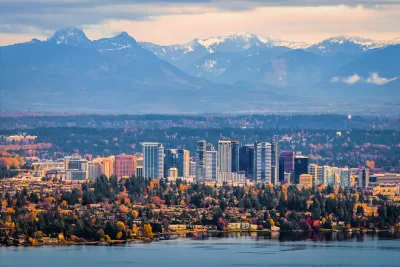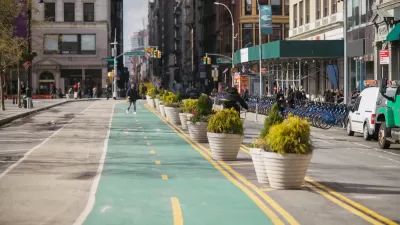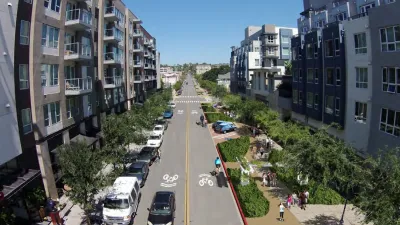The plan reorients the city’s priorities from vehicle throughput and parking to transit, bike infrastructure, and other public amenities.

The city of Bellevue, Washington wants to create a consistent set of rules governing curbside space, reports Ryan Packer in The Urbanist, with a focus on shifting away from single-occupancy vehicle movement and storage through a new Curb Management Plan. “In the works since early 2022, the plan has been molded and shaped over many months of outreach and years of work to provide city leaders a toolkit for how to move forward with rethinking how those valuable spaces function to achieve broader city goals, like improved safety, vibrancy, and increased transit ridership.”
Packer explains that, currently, just 3 percent of Bellevue’s curb space is dedicated to loading zones, bus stops, or transit lanes. 60 percent of curb space is used for vehicle throughput, Packer adds. “Having fast-moving traffic directly next to pedestrian traffic also provides no buffer, impacting the city’s safety goals.”
The plan puts in motion a series of pilot programs, including one that would promote parking in off-street stalls and another that would study the potential for on-street loading. “All of these will be happening against the backdrop of the continued expansion of the city’s bike network along growth corridors near coming light rail stations, a plan being called Bike Bellevue.”
The article quotes Christopher Randels, chair of Complete Streets Bellevue, saying, “I hope that this framework, by creating more spaces that are not devoted to automobile traffic… starts to change the culture of the city in a way that pedestrians, cyclists are more visible, they’re more seen as a part of the transportation ecosystem.”
FULL STORY: Bellevue Rethinks How It Uses Its Most Valuable Real Estate: Curbspace

Maui's Vacation Rental Debate Turns Ugly
Verbal attacks, misinformation campaigns and fistfights plague a high-stakes debate to convert thousands of vacation rentals into long-term housing.

Planetizen Federal Action Tracker
A weekly monitor of how Trump’s orders and actions are impacting planners and planning in America.

In Urban Planning, AI Prompting Could be the New Design Thinking
Creativity has long been key to great urban design. What if we see AI as our new creative partner?

King County Supportive Housing Program Offers Hope for Unhoused Residents
The county is taking a ‘Housing First’ approach that prioritizes getting people into housing, then offering wraparound supportive services.

Researchers Use AI to Get Clearer Picture of US Housing
Analysts are using artificial intelligence to supercharge their research by allowing them to comb through data faster. Though these AI tools can be error prone, they save time and housing researchers are optimistic about the future.

Making Shared Micromobility More Inclusive
Cities and shared mobility system operators can do more to include people with disabilities in planning and operations, per a new report.
Urban Design for Planners 1: Software Tools
This six-course series explores essential urban design concepts using open source software and equips planners with the tools they need to participate fully in the urban design process.
Planning for Universal Design
Learn the tools for implementing Universal Design in planning regulations.
planning NEXT
Appalachian Highlands Housing Partners
Mpact (founded as Rail~Volution)
City of Camden Redevelopment Agency
City of Astoria
City of Portland
City of Laramie





























